Hyundai Staria vs Peugeot Partner - Differences and prices compared
Compare performance (225 HP vs 136 HP), boot space and price (42400 £ vs 22400 £ ) at a glance. Find out which car is the better choice for you – Hyundai Staria or Peugeot Partner?
Costs and Efficiency:
Looking at overall running costs, both models reveal some interesting differences in everyday economy.
Peugeot Partner has a convincingly advantage in terms of price – it starts at 22400 £ , while the Hyundai Staria costs 42400 £ . That’s a price difference of around 20039 £.
Fuel consumption also shows a difference: Peugeot Partner manages with 5.20 L and is therefore clearly more efficient than the Hyundai Staria with 7.60 L. The difference is about 2.40 L per 100 km.
Engine and Performance:
Under the bonnet, it becomes clear which model is tuned for sportiness and which one takes the lead when you hit the accelerator.
When it comes to engine power, the Hyundai Staria has a evident edge – offering 225 HP compared to 136 HP. That’s roughly 89 HP more horsepower.
In acceleration from 0 to 100 km/h, the Hyundai Staria is minimal quicker – completing the sprint in 10.20 s, while the Peugeot Partner takes 11.20 s. That’s about 1 s faster.
There’s also a difference in torque: Hyundai Staria pulls to a small extent stronger with 367 Nm compared to 300 Nm. That’s about 67 Nm difference.
Space and Everyday Use:
Beyond pure performance, interior space and usability matter most in daily life. This is where you see which car is more practical and versatile.
Seats: Hyundai Staria offers decisively more seating capacity – 9 vs 5.
In curb weight, Peugeot Partner is clearly lighter – 1329 kg compared to 2275 kg. The difference is around 946 kg.
In terms of boot space, the Peugeot Partner offers clearly more room – 1800 L compared to 831 L. That’s a difference of about 969 L.
When it comes to payload, Peugeot Partner clearly perceptible takes the win – 991 kg compared to 775 kg. That’s a difference of about 216 kg.
Who wins the race in the data check?
The Peugeot Partner is clearly superior overall in the objective data comparison.
This result only shows which model scores more points on paper – not which of the two cars feels right for you.
Costs and Consumption
View detailed analysis
Engine and Performance
View detailed analysis
Dimensions and Body
View detailed analysis
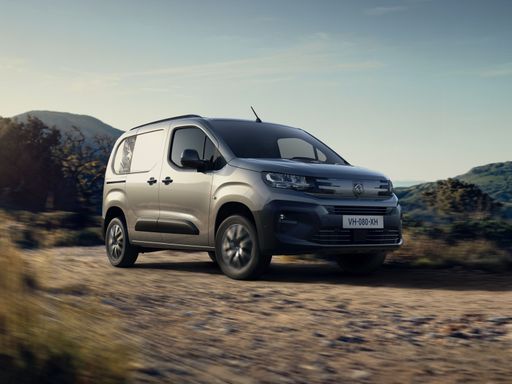
Peugeot Partner
Hyundai Staria
Hyundai Staria looks like a friendly spaceship, its sweeping glass and soft edges turning a people‑mover into a design statement that actually gets noticed. Inside it's airy and practical — perfect for families or anyone who likes travelling in comfort and style, with enough flexibility to swallow luggage and weekend plans without drama.
details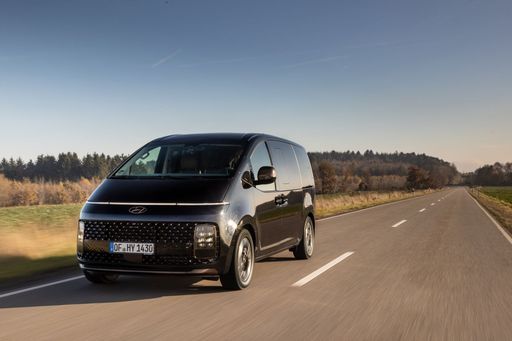
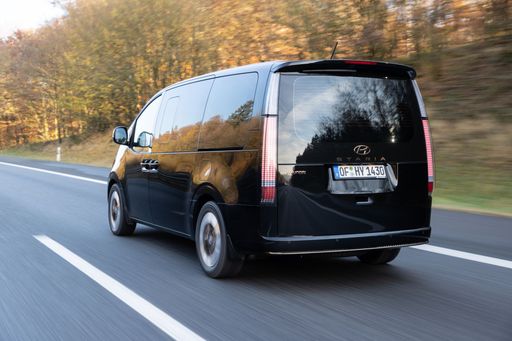
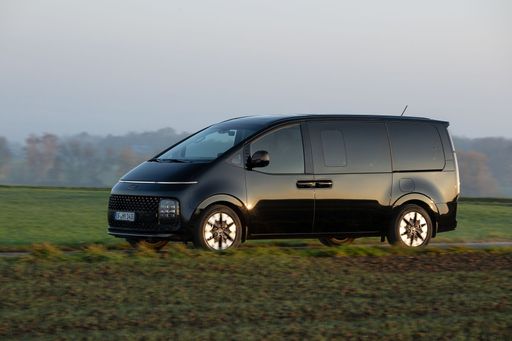
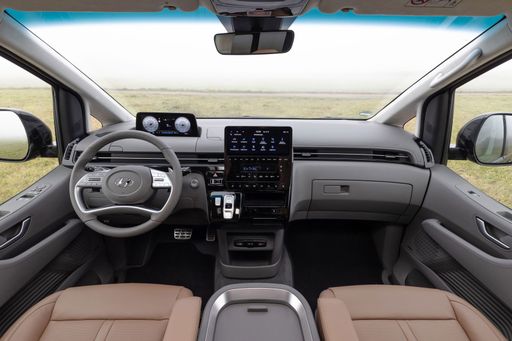
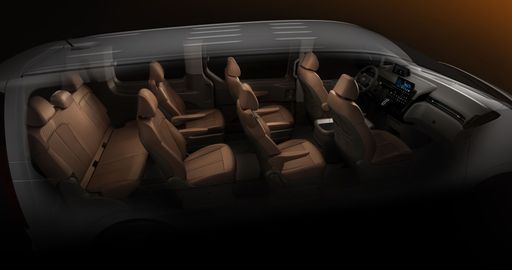
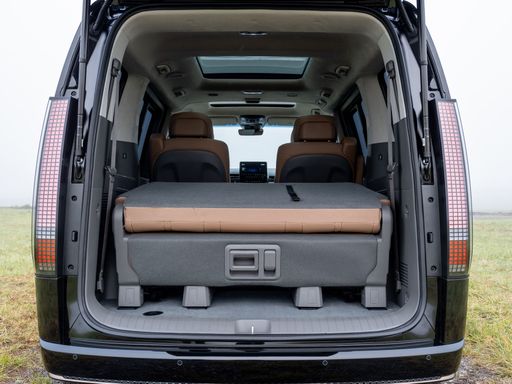
Peugeot Partner
The Peugeot Partner is a no-nonsense workhorse that doubles as a surprisingly comfy family mover, combining clever storage solutions with an easy-to-live-in cabin. It won’t win any beauty contests, but for small businesses and active families it’s practical, economical and utterly reliable when the day gets busy.
details
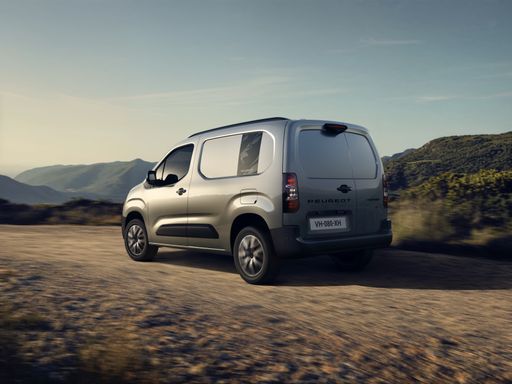
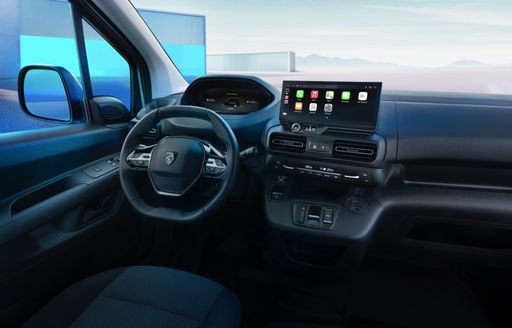
Costs and Consumption |
|
|---|---|
|
Price
42400 - 50500 £
|
Price
22400 - 33800 £
|
|
Consumption L/100km
7.60 L
|
Consumption L/100km
5.2 - 6.3 L
|
|
Consumption kWh/100km
-
|
Consumption kWh/100km
17.40 kWh
|
|
Electric Range
-
|
Electric Range
354 km
|
|
Battery Capacity
-
|
Battery Capacity
-
|
|
co2
172 g/km
|
co2
0 - 143 g/km
|
|
Fuel tank capacity
-
|
Fuel tank capacity
53 - 61 L
|
Dimensions and Body |
|
|---|---|
|
Body Type
Bus
|
Body Type
Cargo Van
|
|
Seats
7 - 9
|
Seats
2 - 5
|
|
Doors
-
|
Doors
4 - 5
|
|
Curb weight
2275 - 2345 kg
|
Curb weight
1329 - 1813 kg
|
|
Trunk capacity
117 - 831 L
|
Trunk capacity
1800 L
|
|
Length
-
|
Length
4403 - 4753 mm
|
|
Width
1997 mm
|
Width
1848 mm
|
|
Height
-
|
Height
1796 - 1812 mm
|
|
Max trunk capacity
-
|
Max trunk capacity
3300 - 4000 L
|
|
Payload
605 - 775 kg
|
Payload
611 - 991 kg
|
Engine and Performance |
|
|---|---|
|
Engine Type
Full Hybrid
|
Engine Type
Electric, Diesel, Petrol
|
|
Transmission
Automatic
|
Transmission
Automatic, Manuel
|
|
Transmission Detail
Automatic Gearbox
|
Transmission Detail
Reduction Gearbox, Manual Gearbox, Automatic Gearbox
|
|
Drive Type
Front-Wheel Drive
|
Drive Type
Front-Wheel Drive
|
|
Power HP
225 HP
|
Power HP
102 - 136 HP
|
|
Acceleration 0-100km/h
10.20 s
|
Acceleration 0-100km/h
11.20 s
|
|
Max Speed
-
|
Max Speed
135 - 183 km/h
|
|
Torque
367 Nm
|
Torque
205 - 300 Nm
|
|
Number of Cylinders
4
|
Number of Cylinders
3 - 4
|
|
Power kW
165 kW
|
Power kW
75 - 100 kW
|
|
Engine capacity
1598 cm3
|
Engine capacity
1199 - 1499 cm3
|
General |
|
|---|---|
|
Model Year
2024
|
Model Year
2024 - 2025
|
|
CO2 Efficiency Class
F
|
CO2 Efficiency Class
A, E
|
|
Brand
Hyundai
|
Brand
Peugeot
|
What drive types are available for the Hyundai Staria?
The Hyundai Staria is available as Front-Wheel Drive.




